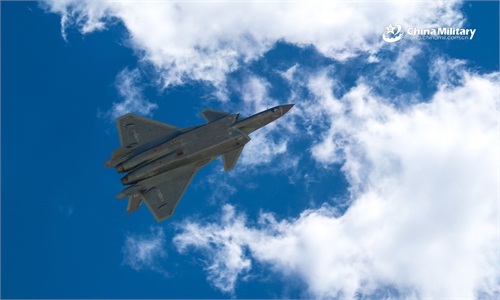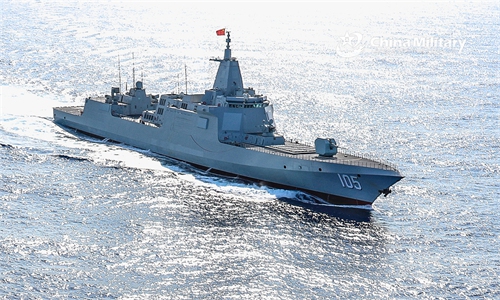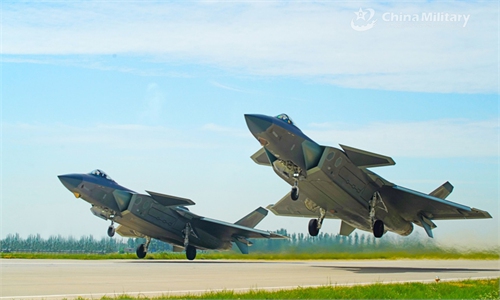Chinese defense chief stresses redline on core issues with Austin
Talks positive, practical and constructive at strategic level: spokesperson
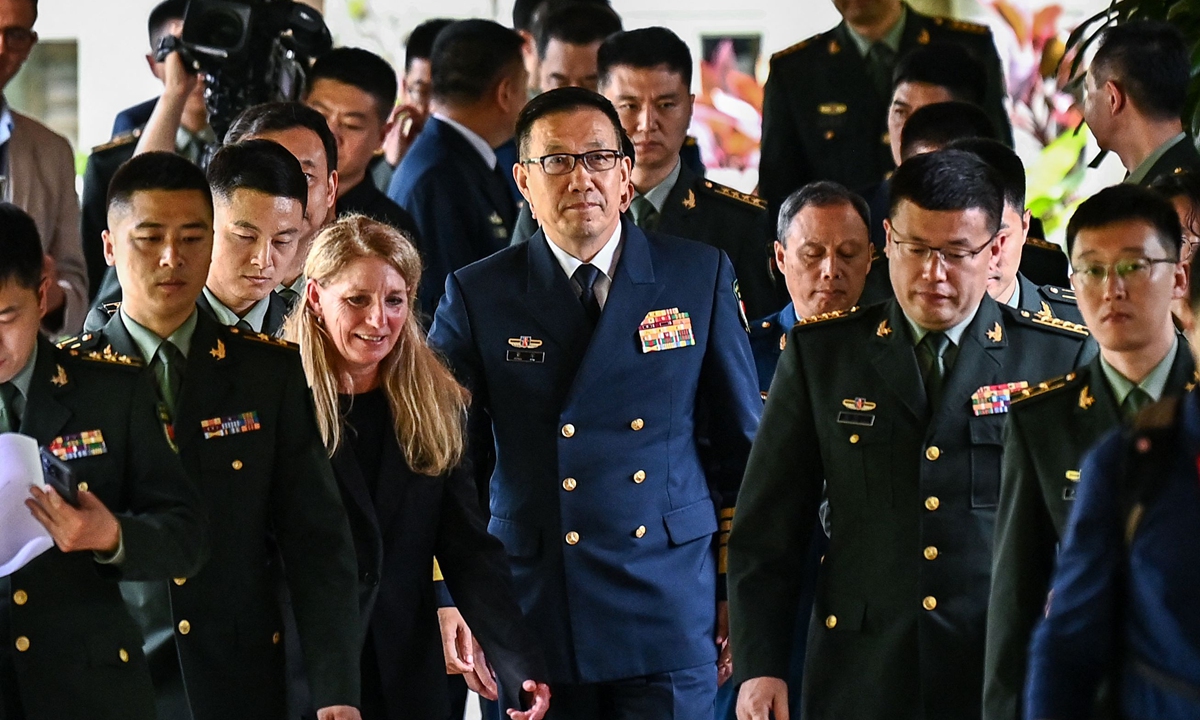
Chinese Defense Minister Dong Jun (center) walks out after a bilateral meeting with US Secretary of Defense Lloyd Austin on the sidelines of the 21st Shangri-La Dialogue in Singapore on May 31, 2024. Photo: VCG
Chinese Defense Minister Dong Jun and US Defense Secretary Lloyd Austin had their face-to-face meeting on Friday on the sidelines of the Shangri-La Dialogue in Singapore, marking the first in-person talks between Chinese and US defense chiefs since November 2022 and a further step in resuming military dialogue and consultations amid recent tensions in the South China Sea and the Taiwan Straits.
Dong reiterated China's firm positions on the Taiwan question and the South China Sea issue, with experts saying that China will firmly defend its national sovereignty, territorial integrity and development interests, as well as safeguard peace and stability in the region.
The meeting lasted 75 minutes, slightly longer than expected, Senior Colonel Wu Qian, a spokesperson at the Ministry of National Defense, told reporters at a press briefing after the meeting.
The meeting was positive, practical and constructive at the strategic level, Wu said, noting that with a meeting like this, the two sides can have a deeper understanding and a firsthand feeling of each other's positions.
During the meeting, the two defense leaders exchanged views on the state-to-state and military-to-military relations between China and the US, as well as the Taiwan question, the South China Sea issue, the Ukraine crisis, and the Palestinian-Israeli conflict, Wu explained.
During the meeting, Dong told Austin that the two militaries' relationship is stabilizing after a decline, which is hard-won and should be carefully cherished, according to Wu.
The purpose of military exchanges should be to enhance understanding, eliminate misunderstandings, build mutual trust, and eventually achieve stability in relations, Dong said, noting that one should not ignore facts, shift blame, or even take chances to smear and suppress the other.
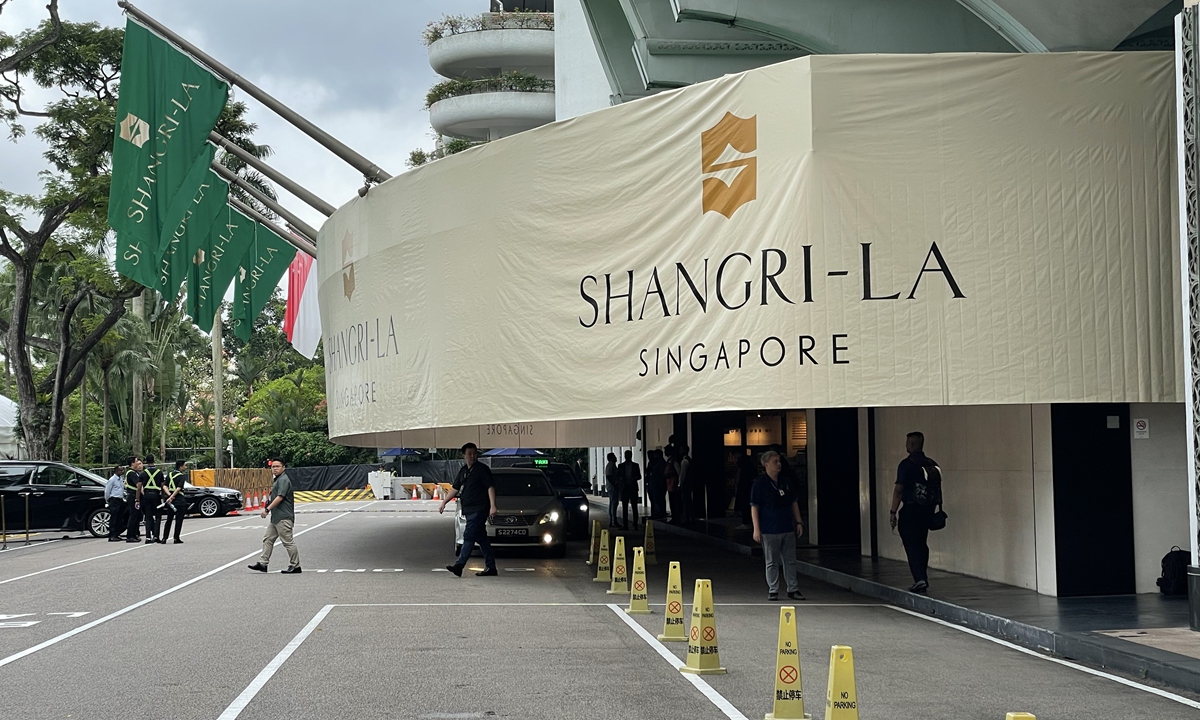
The venue of Shangri-La Dialogue in Sinagpore Photo: Li Aixin/GT
China follows the basic guidelines of valuing peace, stability and trust, and aims to build a non-conflicting, non-confrontational military relationship with open, pragmatic cooperation and gradually accumulating trust, on a basis of equality and mutual respect, Dong said.
Dong urged the US side to effectively implement the consensus reached by the two heads of state in the military field, reflected in concrete actions.
For the next step, the two countries are expected to resume conversations between theater commanders, as spokesperson Wu said that related departments are staying in consultation over the matter.
Lieutenant General He Lei, former vice president of the Academy of Military Sciences of the Chinese People's Liberation Army (PLA), told the Global Times that the meeting represents positive action by the Chinese and US militaries in implementing the consensus reached at the San Francisco summit. It marks a crucial step of turning the San Francisco Vision into reality.
He Lei said the in-person talks indicate the beginning of the restoration of normal high-level interactions between Chinese and American militaries. This is conducive to stabilizing and improving the military relationship between the two countries and helping ties move forward positively.
The face-to-face meeting comes after Dong and Austin had a video call in April.
To implement the important consensus reached during the November summit meeting between the heads of state of China and the US in San Francisco, the two militaries have resumed dialogue and consultations on the basis of equal footing and mutual respect, observers said.
On December 21, 2023, General Liu Zhenli, chief of staff of the Joint Staff Department of the Central Military Commission, had a video talk with General Charles Brown, chairman of the Joint Chiefs of Staff of the US military.
In January, the 17th China-US Defense Policy Coordination Talks were held in Washington DC in the US. In April, Chinese and US militaries held a working group meeting of the Military Maritime Consultative Agreement in Hawaii. In May, the director of the Office for International Military Cooperation under China's CMC held video talks with the US Assistant Secretary of Defense.
These meetings paved the way for the face-to-face talks between the two defense ministers at the Shangri-La Dialogue, observers said.
The in-person meeting is also an opportunity for China's newly appointed defense minister, Admiral Dong, to reaffirm China's principled positions on core interests and major issues face-to-face with Austin. This contributes positively to enhancing mutual understanding between military leaders and managing differences and risks between the two militaries, He Lei noted.
He Lei added that it is essential to emphasize that the US must demonstrate sincerity and integrity by genuinely fulfilling President Biden's repeated commitments, that is to say, the US does not seek a new Cold War with China, does not seek to change China's system, does not seek to revitalize its alliances against China, does not support "Taiwan independence," and has no intention of having a conflict with China.
The US' actions must match its words to avoid empty promises, He Lei said.
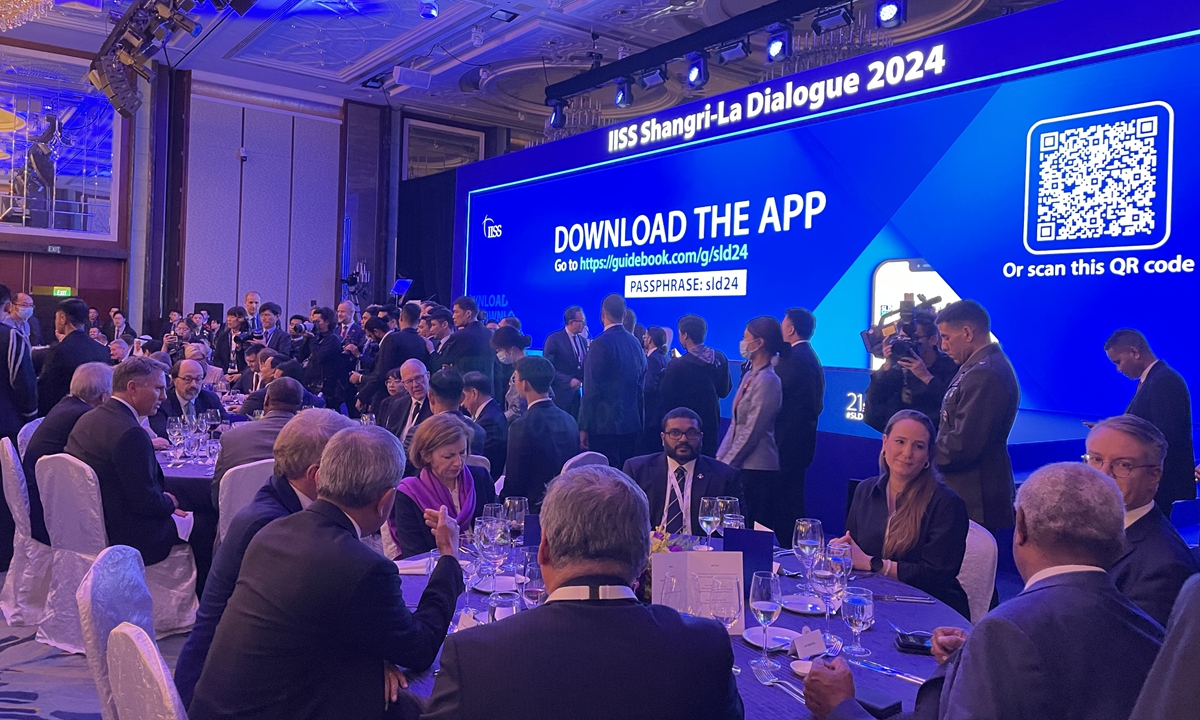
The venue of Shangri-La Dialogue in Sinagpore Photo: Li Aixin/GT
Firm stances
Dong and Austin's meeting comes after large-scale exercises by the PLA to deter "Taiwan independence" secessionist forces following Taiwan regional leader Lai Ching-te's May 20 separatist "inaugural speech", and also takes place amid escalating tensions in the South China Sea resulting from the Philippines' provocative moves over Chinese islands and reefs.
At the meeting, Dong expressed China's firm stance on the Taiwan question.
Regarding the US congratulating Lai on his "inauguration" and sending a delegation to attend the "inauguration ceremony", Dong stated that the Taiwan question is purely China's internal affair, and external forces have no right to interfere.
The US actions seriously violated the one-China principle and the three China-US Joint Communiqués, and went against the commitments it has made, sending a serious wrong signal to the "Taiwan independence" secessionist forces, which China firmly opposes, Dong told Austin.
Dong urged the US to correct its mistakes, adhere to the one-China principle, and not in any way assist "independence" through military means.
Lieutenant General He Lei said that the Taiwan question is the core of China's core interests, the political foundation, and the fundamental principle upon which China establishes diplomatic relations with countries around the world.
It is the first redline that cannot be crossed in China-US relations, and any actions that undermine this core, shake this foundation, or cross this redline will be firmly opposed and resolutely countered by the Chinese people and the Chinese government, He Lei said, noting that the PLA has the unwavering determination, strong will, and formidable capability to resolutely safeguard national sovereignty, security, territorial integrity, and the unity of the motherland.
On the South China Sea issue, Dong said that currently, the Philippines has acted treacherously and provocatively on issues such as Ren'ai Jiao (also known as Ren'ai Reef), which is closely related to instigation and support from external forces.
In particular, the US has deployed mid-range missiles in the Philippines under the guise of military exercises, posing a substantial threat to regional security, a move strongly opposed by China, Dong said.
China insists on resolving differences through equal consultations while adhering to commitments, but will not tolerate actions that escalate provocations, said the Chinese Defense Minister.
Cao Yanzhong, a research fellow at the Academy of Military Sciences of the PLA, told the Global Times that during the administration of former Philippine president Rodrigo Duterte, the South China Sea situation was relatively stable, but this greatly changed after Ferdinand Romualdez Marcos Jr assumed office, in addition to the US instigations that aim to militarily encircle China.
China has two basic stances in the South China Sea issue: maintaining general peace and stability in the region, and firmly safeguarding China's national sovereignty and rights, Cao said.
"We've taken some powerful countermeasures against the Philippine provocations, which served as a demonstration to the world, including the Philippines and the US, that relying on a major power cannot force China to give in on issues of sovereignty," Cao said.
Some are portraying the Chinese delegation as facing greater pressure in this year's dialogue, given the agenda arrangement - having Marcos Jr to deliver a keynote address at the opening ceremony on Friday evening, and the traditional US speech that is often harsh on China.
Spokesperson Wu responded that he did not feel this way because China stands with justice and righteousness.
"I would like to quote from a poem to describe my feeling - despite rising wind and waves, we can sit tight in the fishing boat," Wu said.

